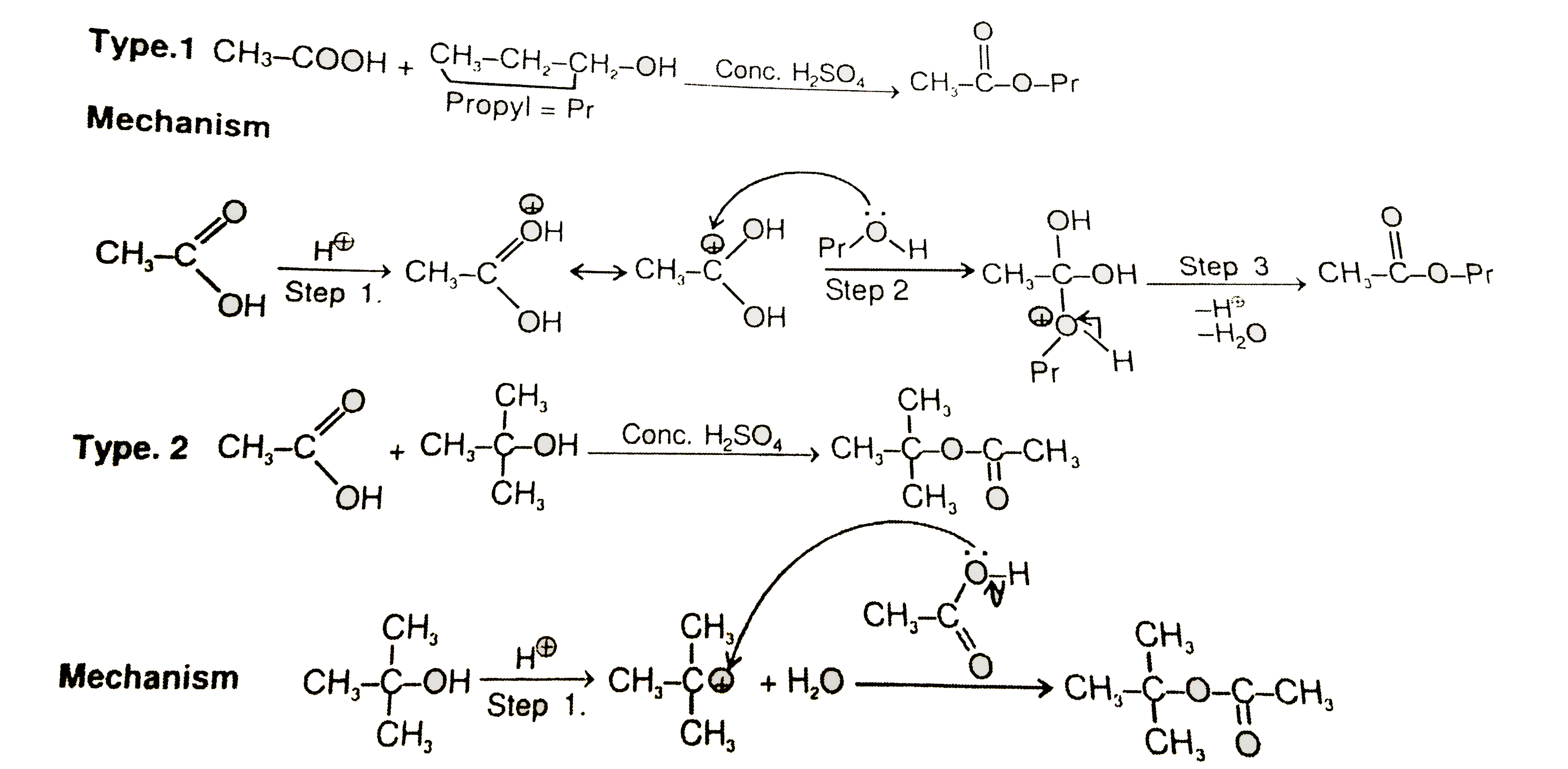CH3COOHLiAlH4−−−→A
A+CH3COOHH3O+−−−→B+H2O
In the above reaction 'A' and 'B' respectively are
CH3COOC2H5,C2H5OH
CH3CHO,C2H5OH
C2H5OH,CH3CHO
C2H5OH,CH3COOC2H5.
The correct Answer is:D
To solve the problem step-by-step, we will analyze the reactions given and identify the compounds 'A' and 'B'.
Step 1: Identify the reaction of acetic acid with lithium aluminium hydride (LiAlH₄)
- The first part of the reaction is:
CH3COOHLiAlH4→A
- Acetic acid (CH₃COOH) is a carboxylic acid. Lithium aluminium hydride (LiAlH₄) is a strong reducing agent that can reduce carboxylic acids to primary alcohols.
- Therefore, when acetic acid is treated with LiAlH₄, it will be reduced to ethanol (C₂H₅OH).
Step 2: Determine the structure of compound A
- From the reduction of acetic acid, we find that:
A=C2H5OH(Ethanol)
Step 3: Identify the reaction of compound A with acetic acid in the presence of H₃O⁺
- The second part of the reaction is:
A+CH3COOHH3O+→B+H2O
- Here, ethanol (A) reacts with acetic acid in the presence of an acid catalyst (H₃O⁺). This reaction is known as esterification, where an alcohol reacts with a carboxylic acid to form an ester and water.
Step 4: Determine the structure of compound B
- The reaction of ethanol with acetic acid will produce ethyl acetate (an ester):
B=C2H5OCOCH3(Ethyl acetate)
Conclusion
- Therefore, the compounds 'A' and 'B' are:
- A = Ethanol (C₂H₅OH)
- B = Ethyl acetate (C₂H₅OCOCH₃)
Final Answer
- A = C₂H₅OH (Ethanol)
- B = C₂H₅OCOCH₃ (Ethyl acetate)
- The first part of the reaction is:
CH3COOHLiAlH4→A
- Acetic acid (CH₃COOH) is a carboxylic acid. Lithium aluminium hydride (LiAlH₄) is a strong reducing agent that can reduce carboxylic acids to primary alcohols.
- Therefore, when acetic acid is treated with LiAlH₄, it will be reduced to ethanol (C₂H₅OH).
- From the reduction of acetic acid, we find that:
A=C2H5OH(Ethanol)
- The second part of the reaction is:
A+CH3COOHH3O+→B+H2O
- Here, ethanol (A) reacts with acetic acid in the presence of an acid catalyst (H₃O⁺). This reaction is known as esterification, where an alcohol reacts with a carboxylic acid to form an ester and water.
- The reaction of ethanol with acetic acid will produce ethyl acetate (an ester):
B=C2H5OCOCH3(Ethyl acetate)
- Therefore, the compounds 'A' and 'B' are:
- A = Ethanol (C₂H₅OH)
- B = Ethyl acetate (C₂H₅OCOCH₃)
- A = C₂H₅OH (Ethanol)
- B = C₂H₅OCOCH₃ (Ethyl acetate)
Topper's Solved these Questions
- ALDEHYDES, KETONES AND CARBOXYLIC ACIDS BOOK - PRADEEPCHAPTER - ALDEHYDES, KETONES AND CARBOXYLIC ACIDS EXERCISE - COMPETITION FOCUS JEE (MAIN AND ADVANCED)/MEDICAL ENTRANCE SPECIEAL (MULTIPLE CHOICE QUESTIONS-II WITH ONE OR MORE THAN ONE CORRECT ANSWER)
1 Video
- ALDEHYDES, KETONES AND CARBOXYLIC ACIDS BOOK - PRADEEPCHAPTER - ALDEHYDES, KETONES AND CARBOXYLIC ACIDS EXERCISE - COMPETITION FOCUS JEE (MAIN AND ADVANCED)/MEDICAL ENTRANCE SPECIEAL (MULTIPLE CHOICE QUESTIONS-II WITH ONE CORRECT ANSWER)
12 Videos
- ALDEHYDES, KETONES AND CARBOXYLIC ACIDS BOOK - PRADEEPCHAPTER - ALDEHYDES, KETONES AND CARBOXYLIC ACIDS EXERCISE - VALUE BASED QUESTIONS WITH ANSWERS
3 Videos
- ALCOHOLS, PHENOLS AND ETHERSBOOK - PRADEEPCHAPTER - ALCOHOLS, PHENOLS AND ETHERSEXERCISE - IMPORTANT QUESTIONS FOR BOARD EXAMINATIONS.
29 Videos
- APPENDIXBOOK - PRADEEPCHAPTER - APPENDIXEXERCISE - MODEL TEST PAPER <br> (Section C )
15 Videos
Similar Questions
Knowledge Check
CH3COOHLiAlH4−−−→A
A+CH3COOHH3O+−−−→B+H2O
In the above reaction 'A' and B respectively areACH3COOC2H5,C2H5OHBCH3CHO,C2H5OHCC2H5OH,CH3CHODC2H5OH,CH3COOC2H5CH3COOHLiAlH4−−−→(A),(A)+CH3COOHH3O+−−−→(B)+H2O . In the above reaction 'A' and 'B' respectively are :
ACH3COOC2H5,C2H5OHBCH3CHO,C2H5OHCC2H5OH,CH3CHODC2H5OH,CH3COOC2H5C2H5COOHLiAlH4−−−→A
AAl2O3−−−→623 KB+H2O
In above reaction A and B respectivelyAC2H5−OH and CH2=CH2BC2H5−CHO and C2H5OHCCH3−CH2−CH2−OH and CH3−CH=CH2DCH3−CH=CH2 and CH3−CH2−CH2−OH
CH3CN+H2OH+−−→AExcessCl2−−−−−→RedPB. In the above reaction A and B are respectively
View SolutionIn the sequence of reaction .
CH3−CH2−CH=CH2(i)B2H6/THF−−−−−−−−−−→(ii)H2O2/NaOHAconc.H2SO4−−−−−−→BH3O+−−−→C
In above reaction A and C are respectively
View SolutionCH3ClKCNA
AH2O+−−−→B(final product) In this reaction 'B' is
View SolutionCH3CIKCN−−→(A)H+/H2O−−−−−→(B)
The compound (B ) in above reaction is :
View SolutionCH3COOH+C2H5OHX−−→CH3COOC2H5+H2O,X is
View Solution

